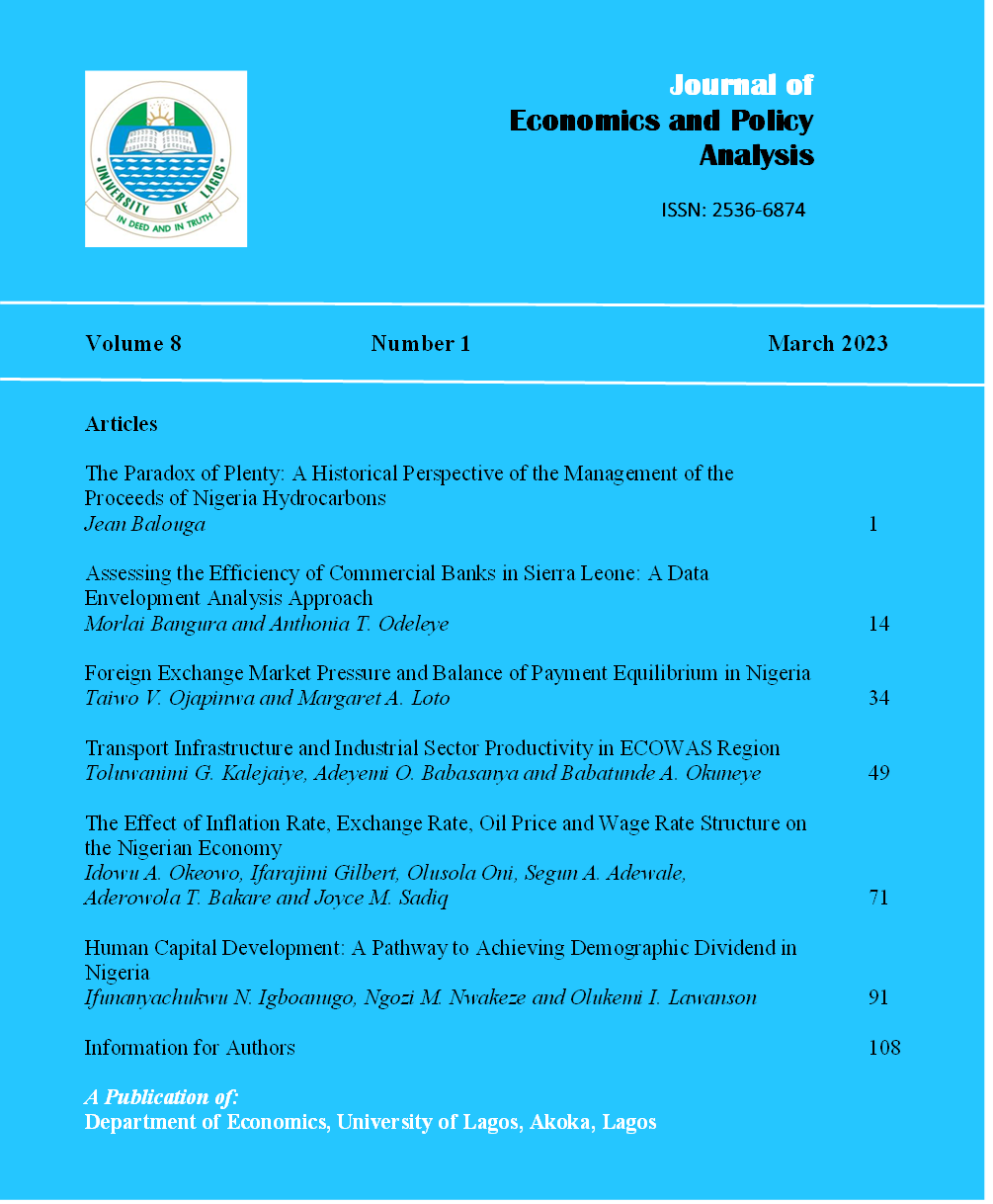The Effect of Inflation Rate, Exchange Rate, Oil Price and Wage Rate Structure on the Nigerian Economy
Abstract
This study primarily looks at the effects of exchange rates, oil prices, and wage structures on economic growth. Additionally, their intricate relationship to economic growth will be covered in this paper. The study employs annual time series data from 1991 to 2022 (covering 31 observations). Accordingly, the data are sourced from the statistical bulletin of the central bank of Nigeria and World bank development indicators, 2022. The study employs real GDP (RGDP) as the dependent variable, which is a stand-in for economic growth, and exchange rate (REXRATE), oil price (OPR), and inflation as independent variables, which are stand-ins for exchange rate fluctuations in Nigeria. In order to empirically analyze the long- and short-term effects of exchange rates, oil prices, and wage structures on economic growth in Nigeria from 1991 to 2022, Pesaran et al. (2001) proposed the multiple Autoregressive Distributed Lag (ARDL) approach to co-integration, which was implemented using the E-Views 10 statistical software. In the short-run analysis, INFLARATE and WAGSTR have positive relationship with the dependent variable whereas EXCRATE and OILPRICE have a negative relationship with the dependent variable. However, in the Long-run analysis EXCRATE, INFLRATE AND WAGSTR have a positive relationship with the dependent variable while OILPRICE has a negative relationship with the dependent variable. Based on the strength of the findings in this study, the following recommendations were suggested: Adopt Comprehensive Exchange Rate Policies, Foster International Trade Relations, Diversify the Economy, Implement Effective Wage Policies, Promote Investment in Human Capital, etc. The findings conclude that economic stability and growth are contingent upon managing these macroeconomic variables effectively. Exchange rate volatility, oil price shocks, and wage disparities can collectively impede economic stability and growth if not appropriately managed.
References
Asaleye, A.J., Ogala, A.F., Aremu, C.O., Ogala, C.E., Lawal, A.I., Inegbedion, H., Popoola, O. (2019), Design and implementation of workers’ pension verification system in central region of Nigeria. International Journal of Mechanical Engineering and Technology, 10(2), 127-136.
Blanchard, O. (2017). Macroeconomics. Pearson.
Blanchard, O., & Fischer, S. (1989). Lectures on macroeconomics. MIT Press.
Card, D., & Krueger, A. (1995). Myth and measurement: The new economics of the minimum wage. Princeton University Press.
Chen, L., & Wang, Q. (2017). The Impact of Oil Price Shocks on Wage Inequality: Evidence from Developing Countries. World Development.
Fama, E. F. (1984). Forward and spot exchange rates. Journal of Monetary Economics, 14(3), 319–338.
Friedman, M. (1963). Inflation: Causes and consequences. Asia Publishing House.
Garcia, R., & Martinez, L. (2016). Exchange rate uncertainty and firm-level investment: Evidence from European countries. Review of International Economics.
Gylych, J., Ahmad J.A., Celik, B., & Isik, A. (2022). Impact of oil price fluctuation on the economy of Nigeria, the core analysis for energy producing countries. IntechOpen. doi: 10.5772/intechopen.94055
Hamilton, J. D. (2009). Causes and consequences of the oil shock of 2007-08. Brookings Papers on Economic Activity, 40(1), 215–283.
Hotelling, H. (1931). The economics of exhaustible resources. Journal of Political Economy, 39(2), 137–175.
Iheanachor, N., Ozegbe, A.E. (2021). The consequences of exchange rate fluctuations on Nigeria's economic performance: An autoregressive distributed lag (ARDL) approach, International Journal of Management, Economics and Social Sciences, 10(2-3), 68-87. https://doi.org/10.32327/IJMESS/10.2-3.2021.5
Khan, A., & Patel, R. (2018). Exchange rate pass-through and wage inflation: Evidence from emerging economies. Journal of International Economics.
Mankiw, N. G., & Taylor, M. P. (2014). Macroeconomics. Worth Publishers.
Mundell, R. A. (1963). Capital mobility and stabilization policy under fixed and flexible exchange rates. Canadian Journal of Economics and Political Science, 29(4), 475–485.
Obstfeld, M., & Rogoff, K. (1996). Foundations of international macroeconomics. MIT Press.
Odoh, C.O., & Edith, O.O. (2023). Exchange rate fluctuations and inflation on economic development in Nigeria: The economic, heart of a nation. Seybold Report Journal, 18(10), 46-64. doi:10.5110/77. 1082
Phillips, A. W. (1958). The relation between unemployment and the rate of change of money wage rates in the United Kingdom, 1861–1957. Economica, 25(100), 283–299.
Smith, J., & Johnson, M. (2019). Oil price volatility and its impact on wage dynamics: Evidence from the U.S. oil industry. Energy Economics.


